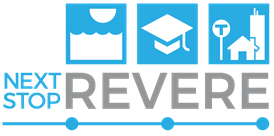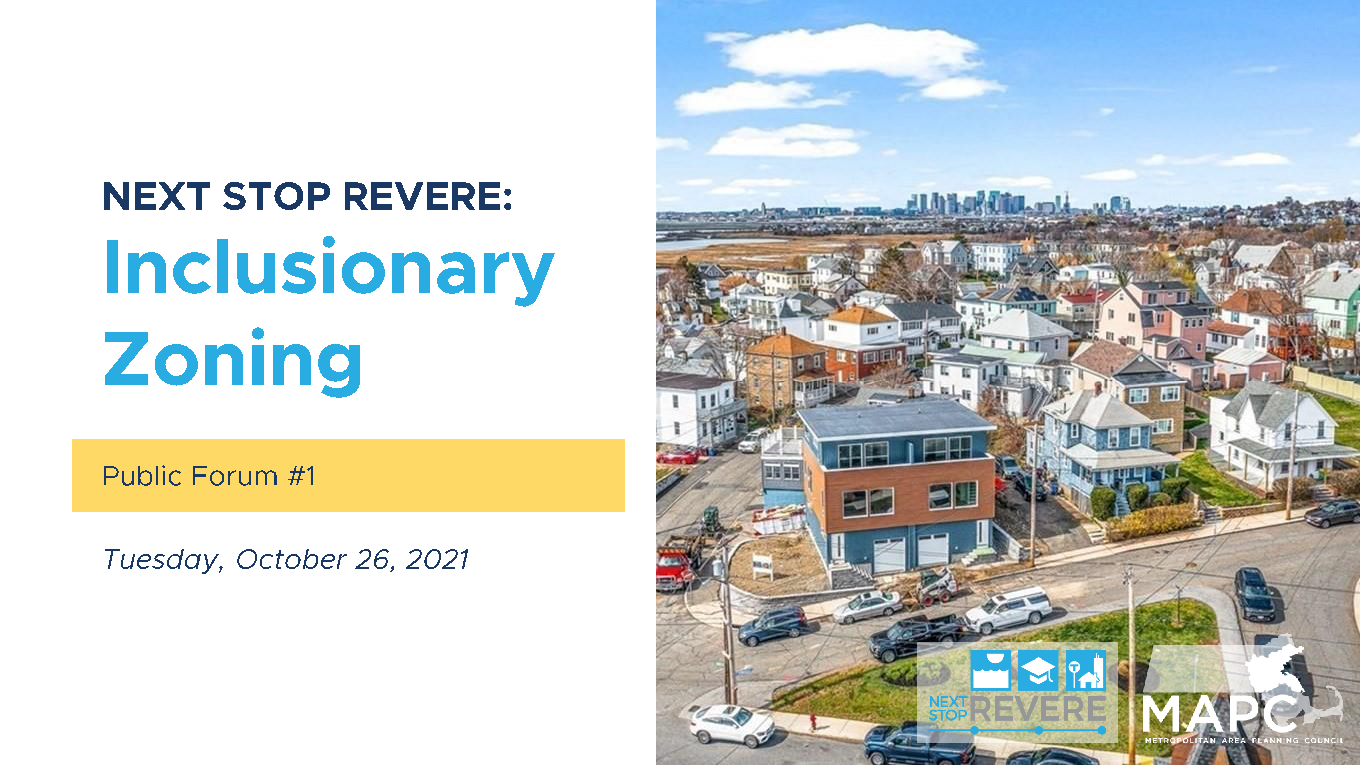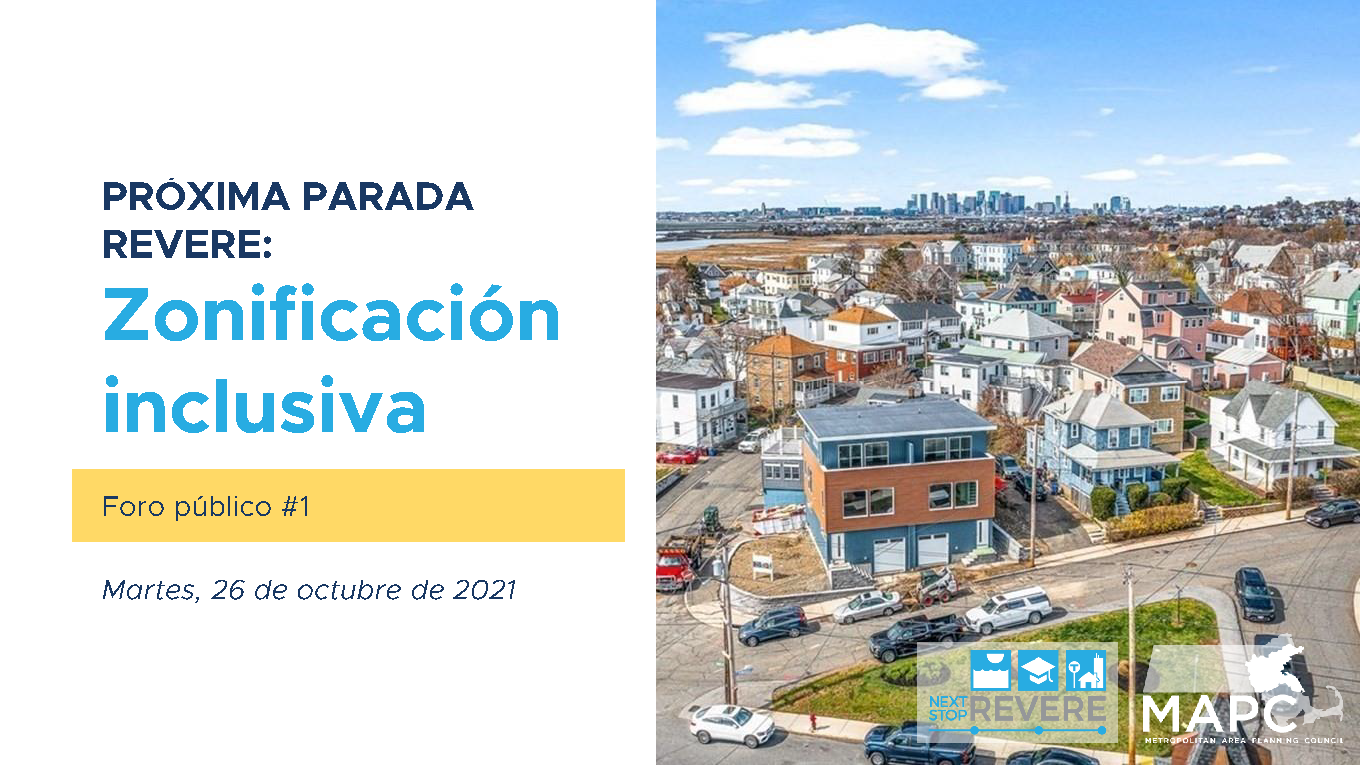Inclusionary Zoning In Context
This previous Inclusionary Zoning page has important context and information about the process. It has now been replaced by a new page you can find at www.revere.org/iz
 As part of the ongoing implementation of Next Stop Revere, the City’s 2020 master plan, Mayor Arrigo is launching a process to develop zoning that will build Revere’s supply of Affordable Housing. A new inclusionary zoning (IZ) ordinance would require new residential developments of a certain scale to provide some units that are deed-restricted to be affordable to lower-income residents. This powerful local tool is one of several new initiatives to implement the master plan and ensure Revere remains the diverse and vibrant community it is today.
As part of the ongoing implementation of Next Stop Revere, the City’s 2020 master plan, Mayor Arrigo is launching a process to develop zoning that will build Revere’s supply of Affordable Housing. A new inclusionary zoning (IZ) ordinance would require new residential developments of a certain scale to provide some units that are deed-restricted to be affordable to lower-income residents. This powerful local tool is one of several new initiatives to implement the master plan and ensure Revere remains the diverse and vibrant community it is today.
March 2 Virtual Forum
How It Works Flyer Cómo funciona
In this video, you’ll hear from Mayor Arrigo and learn about inclusionary zoning recommendations from the Metropolitan Area Planning Council.
Interested in ways to bring more Affordable Housing to Revere? “Inclusionary zoning” will require developers to include affordable units in housing developments above a certain size. Since last fall, the City and Inclusionary Zoning Advisory Committee have led a community- driven process to draft this policy.
Keep an eye on this page for more ways to be involved in the effort to bring more Affordable Housing to Revere
Have questions? Contact the City or Karina Oliver-Milchman, Chief of Housing + Neighborhood Development, MAPC.
Open House Survey Results
In conjunction with the October 26 forum (see below sections), MAPC and Mayor Arrigo launched an online open house to provide community members with an additional opportunity to review the content and discussion items incorporated into the forum. This open house was available from October 25 to December 1, and a summary of findings is now available.
Click here to download a PDF summarizing feedback from the Forum and Open House.
Building on MAPC's presentation, which provided general information about Affordable Housing development, housing development finance, and the main components of inclusionary zoning policies, the open house (conducted as an ongoing survey available in English and Spanish) included a section of questions asking respondents how they felt about an inclusionary zoning policy that achieves deeper levels of affordability.
Recap: October 26 Forum
Thanks to more than 70 residents who joined Mayor Arrigo, the Inclusionary Zoning Advisory Committee, and MAPC at the recent event to help ensure the new zoning serves Revere residents, especially those who struggle with housing affordability, insecurity, or face displacement.
Check out the forum videos here.
October 26 Inclusionary Zoning Forum (English)
October 26 Inclusionary Zoning Forum (Español)
Project Overview and Timeline
The City of Revere’s recently completed master plan, Next Stop Revere, includes the recommendation to develop and adopt an inclusionary zoning ordinance. To advance this recommendation, the City is partnering with the Metropolitan Area Planning Council (MAPC) to lead a process to develop a sensitive policy based on community input, best practices, and Revere’s specific housing needs and market context. The process is led by an Inclusionary Zoning Advisory Committee made up of local residents, community leaders, housing experts, service providers, and others (see below for more information on the IZAC).
The IZAC will work with the City and MAPC to build a timeline.
Community Engagement with IZ
This will be an inclusive process that proactively engages residents who often have limited roles in planning and development efforts, such as renters, low-income residents, people of color, non-native English speakers, working families, and many others. It will also engage developers, municipal staff and elected/appointed officials, and others who will be impacted by the adoption of inclusionary zoning. The project team will use a range of outreach and engagement methods to reach as many stakeholders as possible and ensure that the plan reflects diverse perspectives across the city.
- An Inclusionary Zoning Advisory Committee (IZAC) will lead the process and policy development, providing local knowledge that is integral to developing inclusionary zoning that will meet Revere’s housing needs and also function within the Revere development market and regulatory framework. IZAC members will serve as ambassadors of this work, sharing it throughout the community and encouraging participation. They will meet regularly throughout this process. See below for the announcement of IZAC members.
- This process will incorporate a series of focus groups to allow the City and MAPC project team to meet with stakeholders in small groups and develop a better understanding of housing needs in Revere and residential development and permitting. Focus groups will engage residents, with a particular focus on residents who may be housing insecure; service providers; and City staff and board members that interact with the permitting and approvals process.
- There will be two citywide public forums to hear from stakeholders and share information about this work more broadly. The first forum will provide an overview of inclusionary zoning and seek input from forum attendees on their priorities for a policy for Revere. The second forum will share and collect feedback on different options for inclusionary zoning in Revere based on previously collected community feedback and a financial feasibility analysis.
- At different points during this process, the project team will conduct interviews with local real estate professionals, including developers, realtors, property management agencies, lenders, or equity investors. These interviews will provide a more thorough understanding of Revere’s local housing market conditions, challenges to development in town, utility of potential cost offsets that inclusionary zoning can offer, benchmarks for lenders and investors, and development assumptions.
Links and tools to support the community engagement efforts
Developer Engagement with IZ
A well-designed inclusionary zoning policy effectively balances Affordable Housing need with development feasibility. To determine how to achieve this balance, the project team will engage developers and other real estate professionals active in Revere to better understand their experience and expectations. We will also collect industry market data on rental rates, sale prices, construction costs, and other variables affecting development.
This information will inform a financial analysis using a tool called a pro forma, which is what developers use to determine whether a real estate project is financially feasible. The project team will use this tool to analyze the financial impacts of a variety of inclusionary zoning options, taking into consideration market realities, developer expectations, housing needs, and affordability goals.
By understanding the impacts of inclusionary zoning components on development, the City can avoid a policy that is either cost-prohibitive (and thus results in little, if any, development) or that yields minimal community benefit (and thus fails to fully meet its potential to address housing need in Revere). Modelling different inclusionary zoning options ensures that the policy both reflects developer interests and results in impactful benefits to low-income residents.
IZ News + Materials
Mayor Arrigo Announces Launch of Inclusionary Zoning ProcessSeptember 22, 2021
Appoints Committee of Local Stakeholders to Lead Community In Creating a New Ordinance To Expand Revere’s Supply Of Affordable Housing
Members of the Revere Inclusionary Zoning Advisory Committee
- Dianne Curtin, CAPIC
- Fatou Drammeh, Revere Housing Authority Board of Trustees/Revere Community School
- Joseph Boncore, Former State Senator
- Juan Pablo Jaramillo, Planning Board
- Laura Rosi, Housing Families
- Lor Holmes, Revere Housing Coalition
- Mark Rossi, Chelsea Legal Services
- Olga Tacure, Women Encouraging Empowerment
- Sharon Fosbury, The Neighborhood Developers
What is Inclusionary Zoning?
Inclusionary zoning requires that a certain portion of units within a private housing development be deed-restricted Affordable Housing for low- or moderate- income households. In effect, it relies on the private market to generate Affordable Housing by tying its creation to the production of market-rate housing.
Inclusionary zoning policies consist of a number of interconnected components based on local housing priorities and market conditions, which must work together to achieve community goals and ensure development is financially feasible. For example, policies require a specific rate of units within a development to be Affordable Housing at a particular depth of affordability. To offset the costs of these requirements, municipalities typically offer some combination of bonus measures, such as increased density or reduced parking.
Other common elements of inclusionary zoning include:
- Whether the program is voluntary or mandatory
- Whether policy requirements apply citywide or differ by neighborhood
- The size of development that triggers the inclusionary policy
- Whether the units may be provided on-site, off-site, or in the form of an in-lieu payment
- Length of affordability requirement
- Whether the affordable units must be comparable to the market-rate units
From a legal perspective, inclusionary zoning relies on a municipality’s power to govern land use for a legitimate public purpose (in this case, increasing the supply of Affordable Housing); at the state level, Massachusetts is one of about a dozen states that has passed legislation enabling local inclusionary zoning. Though it was first introduced in the 1970s, most inclusionary zoning policies have been adopted within the past 20 years in response to rising housing costs and, in Massachusetts, in response to the end of rent control. Since 2017, nearly 900 jurisdictions across the country have inclusionary zoning policies, including over 100 cities and towns in Massachusetts.
Learn more about inclusionary zoning
- Massachusetts Housing Partnership Inclusionary Zoning Guidelines for Cities and Towns
- Mass.gov Inclusionary Zoning Module
- Grounded Solutions Network
- DHCD Model Inclusionary Zoning Bylaw
What is Affordable Housing?
Inclusionary zoning is a tool that creates Affordable Housing. But what does that term actually mean? Most people use it to refer to housing that’s within their budget, and most people think to look on the open market to find this housing. But housing planners use a more specific definition of “Affordable Housing” when discussing housing policy and development.
The government considers a home to be “Affordable Housing” when it costs 30% or less of a household’s income and is deed-restricted to income-eligible households (typically of low or moderate incomes). The deed restriction also preserves affordability for at least decades, often in perpetuity. These restrictions ensure that income-eligible households can stay in their communities without having to make difficult financial decisions, such as skipping meals or doctor’s appointments, to have enough money to pay for their homes. Without deed restrictions, housing costs can go up as markets rise, making homes that were once inexpensive now costly. Deed-restricted Affordable Housing protects communities from skyrocketing costs and related displacement.
Eligibility for deed-restricted Affordable Housing is based on household income and the number of people in the household, which is usually compared to the Metropolitan Area Median Income (AMI) calculated by the U.S Department of Housing and Urban Development (HUD).
The 2021 AMI for the Greater Boston region, which includes Revere, is $120,800. Under many Affordable Housing programs, households eligible for deed-restricted Affordable Housing must be at or below 80% of AMI. For a household of one in Revere, 80% AMI is $70,750; for a household of four, it is $101,050. Some Affordable Housing programs serve households with lower incomes than those.
Affordable Housing can take many forms, including public housing and private Affordable Housing, which is typically built by non-profit developers or for-profit developers through mixed-income projects resulting from inclusionary zoning or other policy tools. All Affordable Housing requires some form of rental or operating subsidy, and usually this subsidy comes from the government. In order to be built and maintain operations, today’s Affordable Housing developments usually require multiple subsidies from all levels of government, as well as private debt and foundation funding.
Learn more about Affordable Housing:
Affordable Housing Glossary
Resources
Learn more about Affordable Housing terms
Submit a 30-90 Second Video Testimonial about why affordable housing matters to you.



